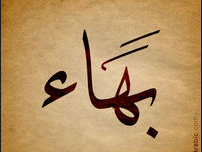
The Arabic word Baha' : Radiant Glory-Splendor-Beauty ...
The word Baha' in select Islamic Tafsir, Hadith, Sirah, Tarikh and other Literatures.
Stephen Lambden, UC Merced,
IN PROGRESS : Last updated 22-02-2018,

Jalal al-Din Maybudi ( 12th century CE)
Kashf al-asrār wa ʿuddat al-abrār
- (“The unveiling of the mysteries and the provision of the pious”). 10 vols. ed. ʿAlī Aṣghar Ḥikmat. Tehran: Intisharat Danishgahi, 1952-1960. This lengthy Persian Tafsir was written from or after 520/1126.
Towards the outset of an opening section et this 12th cent CE Persian Tafsir work, the word baha' is severl times used in comenting on the basmala :
![]()

Q. 1:1 Bismillah (In the Name of God)...
The third mode (al-nawbat al-thalitha) [of the exegesis] of `Bismillah al-Rahman al-Rahim' (In the Name of God, the Merciful, the Compassionate) is that the [letter] "B" ( al-ba') is indicative of Baha'-Allah (the Glory of God), the [letter] "s" (al-sin) of Sana'-Allah (The Brilliance of God) and the [letter] "m" (al-mim) of the Mulk Allah (the Dominion of God).
The "B" (ba') of Bismillah (In the Name of ...) is allusive of the Baha' (radiant Glory) of the Divine Oneness (Baha'-i ahadiyyat), the "S" (sin) of the Sana' (radiance) of the Samadiyyat (the Divine Perpetuity) while the "m" indicates the Kingdom of Divinity [Divine Kingdom] (mulk-i ilahiyyat).
- His Baha' (Glory) is something Self-Subsisting (qayyumi), His Sana' (Radiance) something Ever-Abiding (daymumi) while His Mulk (Dominion) is All-Perpetual (sarmadi).
- His Baha' (Glory) is Ancient of Days [Pre-Existent] (qadim), His Sana' (Radiance) expresses Nobility [Generosity] (karim) while His Mulk (Dominion) is Mighty (`azim).
- His Baha' (Glory) is Splendid [Majestic] (jalal), His Sana' (Radiance) expresses Beauty (jamal) while His Mulk (Dominion) is Ener-Abiding [without any end] (bi zawal).
- His Baha' (Glory) is the Ravisher of the Heart (dil-i riba), His Sana' (Radiance) the Dowry of Abundance (mahr-i faza') while His Mulk (Dominion) is way beyond obliteration (bi fana').
Here the three letters of the "In the Name", the B, S and M are each given a further fourfold level of interpretation, the last of which seems to be on a distinctly Sufi poetical level.
I shall now cite the smooth and insightful translation of William Chittick :
Surah 1: al-Fātiḥa
1:1 In the name of God, the All-Merciful, the Ever-Merciful.
"In terms of allusion and in keeping with the tasting of the lords of recognition, the bi of bism [“In the name”] alludes to the “splendor” [bahāʾ] of Unity, the s to the “brilliance” [sanāʾ] of the Self-Sufficient, and the m to the “kingship” [mulk] of the Divinity. His splendor is self-standing, His brilliance self-sustaining, and His kingship everlasting. His splendor is eternal, His brilliance generous, His kingship tremendous. His splendor is with majesty, His brilliance with beauty, His kingship without decline. His splendor steals the heart, His brilliance increases love, His kingship has no annihilation" trans. Chittick 2015: 1. .
Rashīd al-Dīn Maybudī,
- William C. Chittick, The Unveiling of the Mysteries and the Provision of the Pious By Rashīd al-Dīn Maybudī, Selections Translated by William C. Chittick. Amman, Jordan : Royal Aal al-Bayt Institute for Islamic Thought, Fons Vitae, 2015.
Annabel Keeler
- Sufi Hermeneutics: The Qur’an Commentary of Rashīd al-Dīn Maybudī. Oxford: Oxford University Press, 2006



